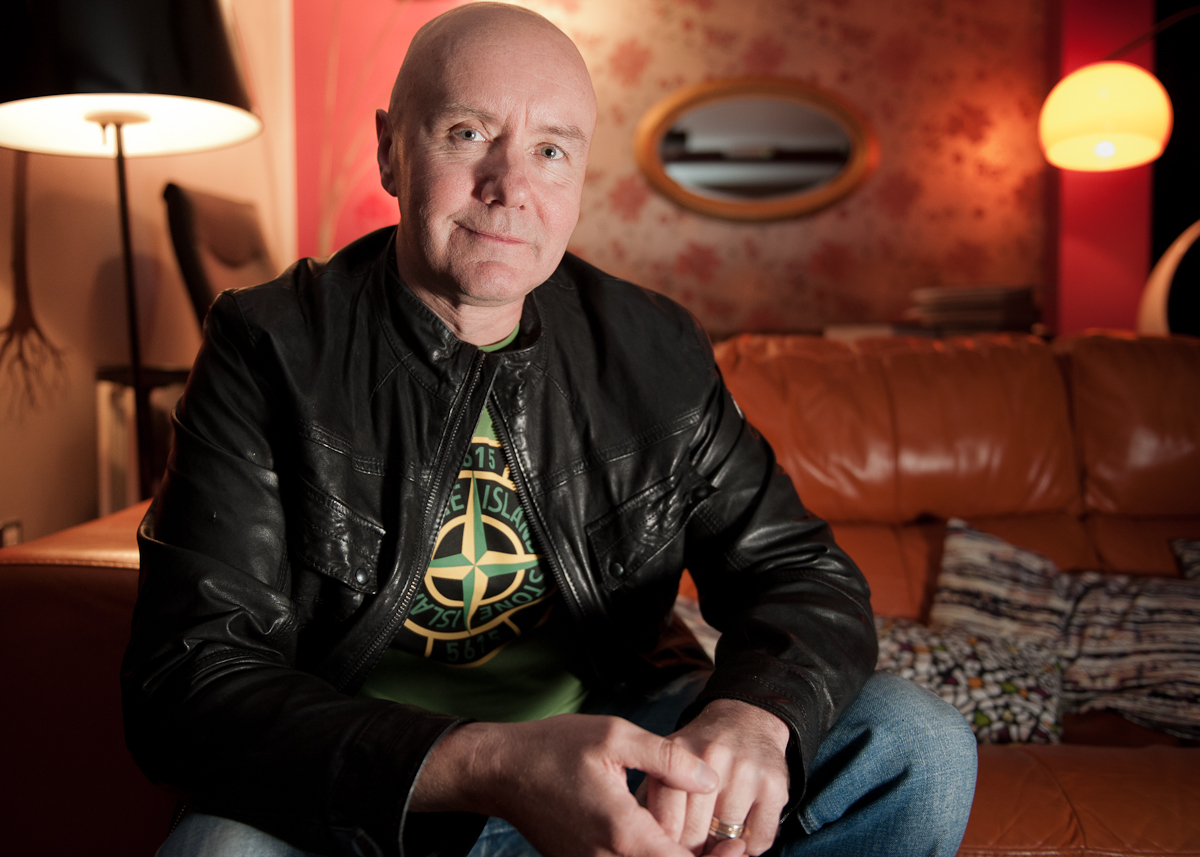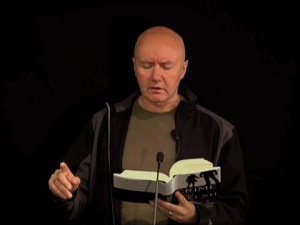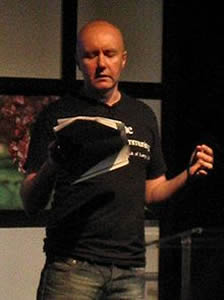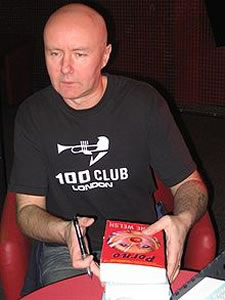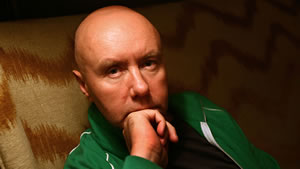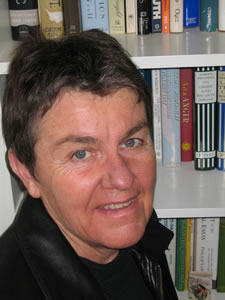De Schotse schrijver Irvine Welsh werd geboren op 27 september 1958 in Leith, Edinburgh. Zie ook mijn blog van 27 september 2008 en ook mijn blog van 27 september 2009.
Uit: Trainspotting
“The sweat wis lashing oafay Sick Boy; he wis trembling. Ah wis jist sitting thair, focusing oan the telly, tryin no tae notice the cunt. He wis bringing me doon. Ah tried tae keep ma attention oan the Jean–Claude Van Damme video.
As happens in such movies, they started oaf wi an obligatory dramatic opening. Then the next phase ay the picture involved building up the tension through introducing the dastardly villain and sticking the weak plot thegither. Any minute now though, auld Jean–Claude’s ready tae git doon tae some serious swedgin. – Rents. Ah’ve goat tae see Mother Superior, Sick Boy gasped, shaking his heid.
Aw, ah sais. Ah wanted the radge tae jist fuck off ootay ma visage, tae go oan his ain, n jist leave us wi Jean–Claude. Oan the other hand, ah’d be gitting sick tae before long, and if that cunt went n scored, he’d haud oot oan us. They call urn Sick Boy, no because he’s eywis sick wi junk withdrawal, but because he’s just one sick cunt.
– Let’s fuckin go, he snapped desperately. – Haud oan a second. Ah wanted tae see Jean–Claude smash up this arrogant fucker. If we went now, ah wouldnae git tae watch it. Ah’d be too fucked by the time we goat back, and in any case it wid probably be a few days later. That meant ah’d git hit fir fuckin back charges fi the shoap oan a video ah hudnae even goat a deck at.
– Ah’ve goat tae fuckin move man! he shouts, standing up. He moves ower tae the windae and rests against it, breathing heavily, looking like a hunted animal. There’s nothing in his eyes but need.
Ah switched the box oaf at the handset. – Fuckin waste. That’s aw it is, a fuckin waste, ah snarled at the cunt, the fuckin irritating bastard. He flings back his heid n raises his eyes tae the ceiling. Ah’ll gie ye the money tae git it back oot. Is that aw yir sae fuckin moosey–faced aboot? Fifty measley fuckin pence ootay Ritz! This cunt has a wey ay makin ye feel a real petty, trivial bastard. – That’s no the fuckin point, ah sais, but withoot conviction. – Aye. The point is ah’m really fuckin sufferin here, n ma socalled mate’s draggin his feet deliberately, lovin every fuckin 4 minute ay it! His eyes seem the size ay fitba’s n look hostile, yet pleadin at the same time; poignant testimonies tae ma supposed betrayal. If ah ever live long enough tae huv a bairn, ah hope it never looks at us like Sick Boy does. The cunt is irresistible oan this form.”
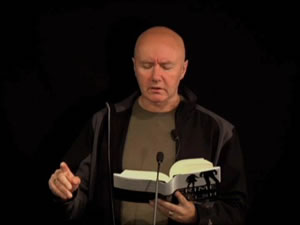
Irvine Welsh (Edinburg, 27 september 1958)
De Amerikaanse dichteres Kay Ryan werd geboren op 27september 1945 in San Jose, California. Zie ook mijn blog van 27 september 2008 en ook mijn blog van 27 september 2009.
Atlas
Extreme exertion
isolates a person
from help,
discovered Atlas.
Once a certain
ratio collapses,
shoulder-to-burden
there is so little
others can do:
they can’t
lend a hand
with Brazil
and not stand
on Peru.
The Pieces That Fall To Earth
One could
almost wish
they wouldn’t;
they are so
far apart,
so random.
One cannot
wait, cannot
abandon waiting.
The three or
four occasions
of their landing
never fade.
Should there
be more, there
will never be
enough to make
a pattern
that can equal
the commanding
way they matter.

Kay Ryan (San Jose, 27 september 1945)
De Tsjechische schrijver en uitgever Josef Škvorecký werd geboren op 27 september 1924 in Náchod. Zie ook mijn blog van 27 september 2009.
Uit: When Eve Was Naked
„From the Diary of Josef Machane, grade one pupil
at the elementary school for boys at K.
Before I started going to school, Mother read to me every night at bedtime, to help me fall asleep. She would turn on the coloured glass lamp by my bed, put on her pince-nez, and read fairy tales. I really hated sleeping, but I liked listening to the stories: there was a wicked witch who ate children and a rotten stepmother who poked out her stepchildren’s eyes, and then when the prince was betrothed to the prettiest of the children, she (the heroine) chopped off both her stepmother’s arms and also one leg. Those fairy tales frightened me so much that I couldn’t fall asleep, which was why Mother had to keep reading on and on, until she fell asleep.
But alas, those wonderful times were soon to be no more. I had to start grade one at the elementary school for boys. I didn’t want to, but they made me. Our teacher, Mrs. Rehakova, taught us reading, and now, as Mother was turning on the lamp she would say to me, “Soon I won’t have to read to you any longer, Joey, because in no time you’ll learn how, and then you’ll be able to read quietly to yourself.” But Iliked having Mother read to me, because she was pretty and had a scratchy voice that helped me to stay awake when she read me the story about Budulinek, the boy who gobbled up everything he could find in the pantry, but was still hungry and then became a cannibal. So I decided not to learn how to read, so that Mother would have to go on reading bedtime stories to me every night. I kept my resolution steadfastly, and at midterm I got a failing grade in reading from Mrs. Rehakova. My father got very mad.
“A failing grade in such an elementary subject!” His voice was so loud that it shook the chandelier, which was also made of coloured glass. “Even Vozenil, the poor widow’s son who comes to our house at least twice a week for lunch, managed a D minus, but look at this! My own son’s report!” He stopped shouting and began removing his belt, then bent me over his knee and strapped me hard.“
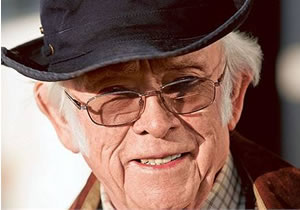
Josef Škvorecký (Náchod, 27 september 1924)
De Nederlandse schrijfster Esther Verhoef-Verhallen werd geboren in ’s-Hertogenbosch op 27 september 1968. Zie ook mijn blog van 27 september 2009.
Uit: Erken mij
„Ik beef ongecontroleerd over mijn hele lichaam en ik voel me koortsig, doodmoe. Uitgeput bijna. Te moe om mijn spullen te pakken en het hotel te verlaten, zelfs te moe om te huilen. Of is het apathie? Minuten gaan voorbij, waarin ik probeer me te concentreren op mijn ademhaling en niet meer in staat ben tot meer dan dat. Dan loop ik de badkamer in, draai de stop van de jacuzzi dicht en zet de kranen open. Uit een mandje op een glazen planchet pak ik een chick uitziend flesje douchegel, Hermés. De inhoud ruikt naar sinaasappel. Ik haal de rest van de flesjes ook uit het mandje en spuit ze allemaal leeg in het enorme bad. De brede waterstraal maakt er een dikke. Romige schuimlaag van.“
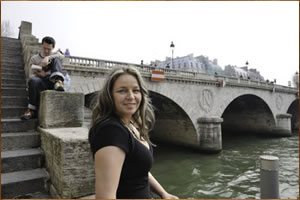
Esther Verhoef (‘s-Hertogenbosch, 27 september 1968)
De Amerikaanse schrijver Louis Stanton Auchincloss werd geboren op 27 september 1917 in Lawrence, New York. Louis Auchincloss overleed op 26 januari van dit jaar op 92-jarige leeftijd. Zie ook mijn blog van 27 september 2009.
Uit: The Young Apollo and Other Stories
„The Young Apollo I have decided to put my thoughts about Lionel Manning together in this memorandum. I have to make up my mind, and soon, whether or not I shall accede to Senator Mannings request that I compose a short life of his son, Lionel, or “Lion” as we elders used to call him. It is now five years since Lion died of heart failure, aged thirty-one, in 1913, just before the outbreak of the long and terrible war that has cast the stain of doubt over the ideals we thought our boys were fighting for, as seemingly exemplified in the golden image of my young friend. I use the word “young” more in contrast to my own seventy summers than to emphasize a life so cut short, for it was characteristic of Lion in the matter of friendship to take no account of age, which endeared him to many of my contemporaries. Perhaps he offered us the illusion of some kind of life after death. There is a cynical side of my old crusty bachelor self that whispers that it may have been just as well that Lion died when he did. After all, there is something fine and noble in an early demise. We can always now see him in a halo of glory, with his gleaming blond hair, his laughing gray- blue eyes, his gracefully molded features, his splendid muscular torso; we can hear his excited tones voicing his high principles; we can feel that he has taken his proper place in the gallant and in- spiring company of the slain English friends whom he met as a Rhodes scholar. Dont we glimpse through the darkness of today the broad green lawn of an Edwardian garden party and wonderful young men in blazers and white flannels talking of the great things they would do in a future they would never have? The wrong people have survived this war.
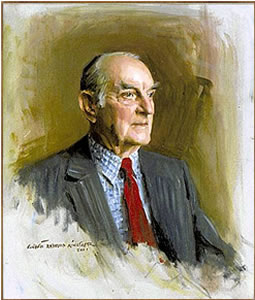
Louis Auchincloss (27 september 1917 – 26 januari 2010)
Portret door Everett Raymond Kinstler, 2001
De Engelse dichter en criticus William Empson werd geboren op 27 september 1906 in Howden, Yorkshire. Zie ook mijn blog van 27 september 2009.
Missing Dates
Slowly the poison the whole blood stream fills.
It is not the effort nor the failure tires.
The waste remains, the waste remains and kills.
It is not your system or clear sight that mills
Down small to the consequence a life requires;
Slowly the poison the whole blood stream fills.
They bled an old dog dry yet the exchange rills
Of young dog blood gave but a month’s desires.
The waste remains, the waste remains and kills.
It is the Chinese tombs and the slag hills
Usurp the soil, and not the soil retires.
Slowly the poison the whole blood stream fills.
Not to have fire is to be a skin that shrills.
The complete fire is death. From partial fires
The waste remains, the waste remains and kills.
It is the poems you have lost, the ills
From missing dates, at which the heart expires.
Slowly the poison the whole blood stream fills.

William Empson (27 september 1906 – 15 april 1984)
Empson staande rechts, 2e van rechts George Orwell, voor de microfoon T. S. Eliot.
Voor de BBC radio in 1941
De Occitaanse dichter en schrijver Bernat Manciet werd geboren op 27 september 1923 in Sabres. Zie ook mijn blog van 27 september 2009.
L’enterrament a Sabres (Fragment)
Le Seigneur me laboure au brabant
il m’ouvre comme une grande chevaine
mon soleil laisse fuir ses graines de nuit
mon soleil va germer – je m’y perds
Mais toi qui donnes l’élan au seigle
aux maisons et à la longue acclamation des pluies
sur les sillons en tous genres
au murmure noir du populaire
regarde donc ma conscience ouverte en toutes ces pulsations blanches
c’est comme un vautour de plumes blanches
d’où me viennent ces hectares enfantés ?
mon âme c’est ta foudre d’acétylène
éclaire-moi ces lointains l’un derrière l’autre
afin que je te voie
éclaire-toi comme la foudre discrète
ne te cache pas comme ça
j’ai peut-être pêché mais pour savoir si tu es juste
ce temps ce temps va changer
dis-moi Seigneur si je fais encore peur
à l’heure du boulanger
les morts tu sais ne servent pas à grand chose
pour Te parler
mais le seul vif du vif de ce four retiré
Il n’appartient qu’à toi dans la peur
de faire ce qu’il faut pour qu’en une Sabres éternelle
nous vivions à vif lorsque dansent sur place les jardins

Bernat Manciet (27 september 1923 – 3 juni 2005)
De Sloveense dichter, schrijver en essayist Edvard Kocbek werd in Sloveens Stiermarken geboren op 27 september 1904. Zie ook mijn blog van 27 september 2006 en ook mijn blog van 27 september 2008 en ook mijn blog van 27 september 2009.
Church In The Slovenian Hills
Dappled tent
of weary pilgrims
the protective color
of the wise turtle
lichen of ancient nights
moss of placid forests
the silence of a butterfly —
duration achieved by
patience —
but it is not a sphinx
or a fish
or a fairy dragon
but a weary ox
with a thick head
leaning against the sky
opening at times
his kind eyes
for the fragrant hay
and the intoxicated incense
for a cock in the wind
and bronze bells
he still watches over
the holy manger
connecting existent things
with those not yet created;
there are no cracks
be still, heart
beat softly
so that the message
of the silent parchment
docs not fall
to dust.
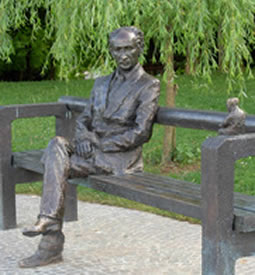
Edvard Kocbek (27 september 1904 – 3 november 1981)
Edvard Kocbek monument in het Tivoli park in Ljubljana
De Oostenrijkse dichter, bibliograaf, bibliothecaris en vertaler Johann Nepomuk Cosmas Michael Denis werd geboren in Schärding op 27 september 1729. Zie ook mijn blog van 27 september 2009.
Sineds Morgenlied (Fragment)
Harfe! steig nieder. Der Tag erwachet. Sein Aug
Blicket aus Osten auf dich.
Hörst du der Schwalbe Geschäft? Sie lobet schon lang’
Oben am Giebel das Licht.
Hörst du den Morgenhauch
In dem Gezweig’ umher?
Harfe! steig nieder zu mir, begleite mein Lied!
Rein ist das Obergewölb der Schöpfung und blau,
Kühl ist der Odem der Luft.
Dünn ist der Schleier von Duft, der über der Flur
Trächtigem Busen sich dehnt.
Bunt ist der frische Thau,
Der durch den Schleier blitzt.
Hold ist der Morgen, und hold auch, Barde! für dich.
Als dich noch gestern zu Nacht dein Lager umfing,
Warst du des Morgens gewiß?
Konnte dein Leben nicht gleich der Rose verblüh’n,
Die sich nun nimmer erneut?
Aber Allvaters Huld
Läßt dich auch heute noch
Trinken vom Strome der Lust, der alles berauscht.

Michael Denis (27 september 1729 – 29 september 1800)
De Duitse dichter en schrijver Christian Schloyer werd geboren op 27 september 1976 in Erlangen. Schloyer behaalde een licentiaat in wijsbegeerte, germanistiek, theater en media studies in Erlangen. Hij was initiatiefnemer en mede-oprichter van de schrijversgroep en schrijfwerkplaats “Wortwerk” in Erlangen en Neurenberg (2000) en is redacteur van het literaire tijdschrift “Laufschrift” (sinds 2007).
an den angler in monets bildern
merk dir nie an den wolken (wenn
da ein meer ist – & da
ist ein meer) wo du die fisch
falle versenkst, merk dir immer das über
fließende blau (merks dir am
über) am fluss vom himmel
ins meer, merk dir genau wann
du das meer in den himmel
versenkst, merk dir kein meer
an den wolken (& es gibt diese
wolken – nicht alle sind blau) merk dir am besten
den fisch
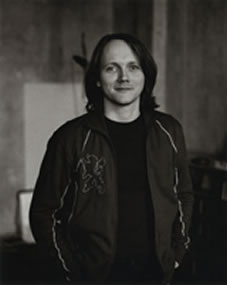
Christian Schloyer (Erlangen, 27 september 1976)
De Duitse schrijfster Tanja Kinkel werd geboren op 27 september 1969 in Bamberg. Zie ook mijn blog van 27 september 2006. en ook mijn blog van 17 september 2007 en ook mijn blog van 27 september 2008 en en ook mijn blog van 27 september 2009.
Uit: Im Schatten der Königin
„Montag, 9. September 1560 G
Gott vergebe mir, aber das Erste, was ich dachte, als Robin Dudley mir sagte, seine Gemahlin sei tot, war: Warum jetzt? Für mich und die Meinen war es eine gute Zeit, und eine, auf die wir lange hatten warten müssen. Seit meine Base Jane vor vierzig Jahren John Dudley geheiratet hatte, waren wir miteinander im Rad der Fortuna gefangen gewesen und hatten uns nicht mehr lösen können, ganz gleich, ob es uns hoch oder abwärts trug. Ich wurde an Janes Hochzeitstag geboren, und sie hat das immer als Grund gesehen, sich wie eine Patin um mich zu kümmern. Da meine eigene Mutter von Fehlgeburt zu Fehlgeburt immer schwächer wurde und starb, noch ehe ich acht Jahre alt war, gab es lange Zeit niemanden, der für mich so wichtig war wie Jane. Es gab einen Lehrer, John Ferlingham, der mich bis aufs Blut quälte. Es bereitete ihm offensichtlich Spaß, bei jedem noch so kleinen Fehler, den ich im Unterricht machte, seinen Rohrstock auf meinem nackten Hintern tanzen zu lassen. Doch schlimmer als der Stock war es, seine Hände auch dort zu spüren. Ich wusste damals noch nichts davon, dass manche Männer es auch mit Jungen treiben wollten, aber mir war klar, dass irgendetwas nicht stimmte. Sosehr ich es auch versuchte, ich fand keine Ausrede, die mich davor schützte, nach der Schule zu ihm zu gehen, um meine Gebete mit ihm zu sprechen, wie er das wünschte. Mein Vater bemerkte nichts; eine Tracht Prügel zur rechten Zeit habe noch niemandem geschadet, so lautete seine Überzeugung, die er noch von seinem Urgroßvater hatte, der über Jahrzehnte Sheriff von Shropshire gewesen war. Ich wäre damals lieber gestorben, als ihm einzugestehen, dass ich nicht Angst vor den Schlägen hatte, sondern vor den Händen des Lehrers an meinem Arsch. Jane dagegen gab sich nicht damit zufrieden, meine wirkungslosen Ausreden als kindliche Bockigkeit abzutun. Es gelang ihr, die Wahrheit aus mir herauszulocken. »Das, was er tut, ist Unrecht«, sagte sie mit ernster Stimme. Ich spürte, dass ich den Tränen nahe war.“
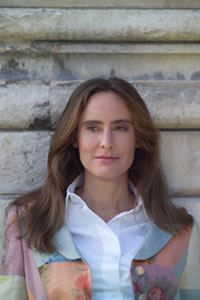
Tanja Kinkel (Bamberg, 27 september 1969)
De Poolse dichter en vertaler Wacław Koźma Damian Lieder,ook: Rolicz-Lieder werd geboren op 27 september 1866 in Warschau. Zie ook mijn blog van 27 september 2008 en ook mijn blog van 27 september 2009.
LILIEN EIGENE BLUMEN
Ich schreite mit des prunkenden herzens gefühlen,
Nach traurigen lebens rötlichen gestaden ·
Ich schreite mit weisen gedanken auf marmorner stirne
Durch blinder erinnrungen zerfallene arkaden.
Bevor die sonne den himbeerfarbenen fächer
Entfaltet und meeresvögel den schrei erheben
Besteig ich voll sanftmut das gespenstische fahrzeug
Des schwarze segel zur insel der toten streben.
Mit angespielter leier zartem gesange
Entfach ich was von sterbender liebe noch glüht
Und segne diese duftende einzige wahre
Von der in der ferne ein herz ohne namen blüht.
Wach auf die du mich geleitet durch einsame jahre
Wach auf die du mich geleitet durch einsame jahre
Smaragdener stern meines lebens · wach auf!
Wach auf · du leuchtende sfinx · denn es läutet
Zum angelus droben vom turme der kirche – wach auf!
Die kräuter der schlummernden felder duften berückend
Und stimmen ertönen vom grünlichen wasser – wach auf!
Wach auf! dem auge des himmels fallen die lider
Vorm kusse der feierlichen nacht – wach auf!
Wach auf! meine arme erhoben sich zum gebete ·
Erhoben sich wie zwei gespenstische vögel – wach auf!
Vertaald door Stefan George
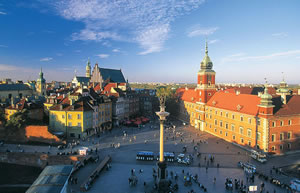
Wacław Rolicz-Lieder (27 september 1866 – 25 april 1912)
Warschau
De Franstalige Zwitserse schrijver en filosoof Henri-Frédéric Amiel werd geboren op 27 september 1821 in Genève. Zie ook mijn blog van 27 september 2009.
Uit: Journal (Vertaald door Mrs. Humphrey Ward)
„BERLIN, July 16. 1848.—There is but one thing needful—to possess God. All our senses, all our powers of mind and soul, all our external resources, are so many ways of approaching the divinity, so many modes of tasting and of adoring God. We must learn to detach ourselves from all that is capable of being lost, to bind ourselves absolutely only to what is absolute and eternal, and to enjoy the rest as a loan, a usufruct…. To adore, to understand, to receive, to feel, to give, to act: there is my law my duty, my happiness, my heaven. Let come what come will—even death. Only be at peace with self, live in the presence of God, in communion with Him, and leave the guidance of existence to those universal powers against whom thou canst do nothing! If death gives me time, so much the better. If its summons is near, so much the better still; if a half-death overtake me, still so much the better, for so the path of success is closed to me only that I may find opening before me the path of heroism, of moral greatness and resignation. Every life has its potentiality of greatness, and as it is impossible to be outside God, the best is consciously to dwell in Him.
BERLIN, July 20, 1848.—It gives liberty and breadth to thought, to learn to judge our own epoch from the point of view of universal history, history from the point of view of geological periods, geology from the point of view of astronomy. When the duration of a man’s life or of a people’s life appears to us as microscopic as that of a fly and inversely, the life of a gnat as infinite as that of a celestial body, with all its dust of nations, we feel ourselves at once very small and very great, and we are able, as it were, to survey from the height of the spheres our own existence, and the little whirlwinds which agitate our little Europe.
At bottom there is but one subject of study: the forms and metamorphoses of mind. All other subjects may be reduced to that; all other studies bring us back to this study.“
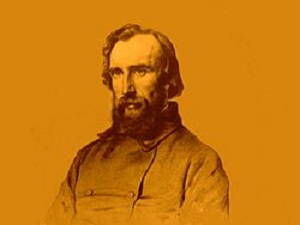
Henri-Frédéric Amiel (27 september 1821 – 11 mei 1881)
De Italiaanse schrijfster Grazia Deledda werd geboren op 27 september 1871 in Nuoro op Sardinië. Zie ook mijn blog van 27 september 2007 en ook mijn blog van 27 september 2008 en ook mijn blog van 27 september 2009.
Uit: Ashes (Vertaald door Jan Kozma)
„And she thought of the little naked birds in the deserted nest; of her poor little neglected brothers; of Anania’s treasure; of midsummer night; and of her dead mother. She was afraid—she was sad, so sad that though she believed herself doomed to hell, she longed to die. Ol!’s son was born at Fonni in the springtime. He was called Anania by the advice of his godmother, the bandit’s widow. He passed his infancy at Fonni, and in his imagination never forgot that strange village perched on the mountain crest, like a slumbering vulture. During the long winter, Fonni was all snow and fog ; but with the spring grass invaded even the steep village street, where beetles slept among the big, sun-warmed cobblestones, and ants ran confidingly in and out of their holes. The meagre brown houses with their roofs of scandtde (wooden tiles overlapping each other like fish- scales), showed on the street side narrow black doorways, balconies of rotten wood, little stairs often vine-garlanded. The Basilica of the Martyrs, with its picturesque belfry, rose among the green oaks of the old Convent court, dominating the whole little town and carved against a sky of crystalline blue. Fabulous beauty reigned on all sides. The tall mountains of the Gennargentu, their luminous summits outlined as it were with silver,crowned the great Barbagia valley, which in a succession of immense green shells rose to the hill-topS; among these Fonni with its scaled roofs and stony streets, defied the thunder and the winds. The district was in winter almost deserted, for its numerous population of wandering shepherds (men strong as the blast, and astute as foxes) descended with their flocks to the warm southern plains….“
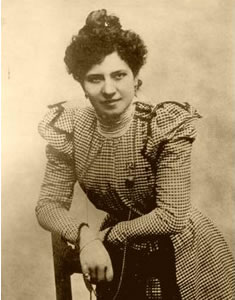
Grazia Deledda (27 september 1871 – 15 augustus 1936)
